Wrinkles are a natural part of the ageing process, but that doesn't mean we have to accept them as inevitable. There are plenty of home remedies that can help reduce wrinkles and make your skin look and feel youthful. In this article, we'll share some of the best natural ways to reduce wrinkles on your face, neck, hands, and around your eyes.
Home remedies to reduce wrinkles on the face
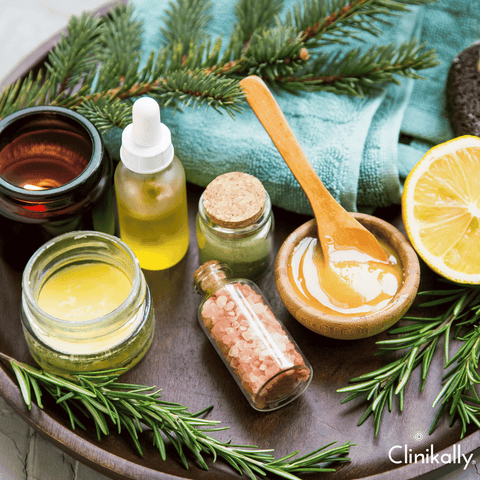
People frequently employ some natural home treatments to help minimise the appearance of facial wrinkles. Although these treatments might not completely remove wrinkles, they might help to improve the texture of the skin and lessen their visibility. Here are a few well-liked DIY remedies:
-
Aloe vera gel: Aloe vera gel is a natural moisturiser that can help reduce wrinkles and fine lines. Simply apply the gel to your face and leave it on for 20 minutes before rinsing off.
-
Coconut oil: Coconut oil is rich in antioxidants and fatty acids that can help keep your skin hydrated and smooth. Massage a small amount of coconut oil into your skin before bed to wake up with softer, more youthful-looking skin.
-
Egg whites: Egg whites are a great natural remedy for wrinkles. Simply beat a couple of egg whites until they're foamy and apply to your face. Leave on for 15-20 minutes before rinsing off.
If you're looking for natural ways to reduce wrinkles on face it always better to consult a doctor who can look into your underlying skin condition and recommend best treatment plan. At Clinikally, you get online dermatologist consultation from leading dermatologists in India hassle free and get best anti-ageing skincare shipped directly to your doorstep.
DIY anti-wrinkle face masks
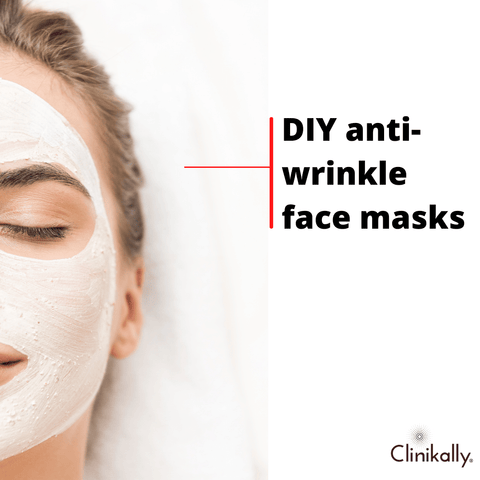
Here are a few DIY face mask recipes that may help reduce the appearance of wrinkles and improve skin elasticity. However, because individual skin reactions vary, it is best to perform a patch test on a small area of skin before applying the mask to your face.
-
Avocado and Honey Mask:
-
Ingredients: 1 tablespoon honey and ½ ripe avocado
-
Instructions: Until smooth, mash the avocado. Mix in the honey until thoroughly combined. Allow the mixture to sit on your clean face for 15-20 minutes. Rinse thoroughly with lukewarm water.
-
Banana and Yogurt Mask:
-
Ingredients: ½ ripe banana, 1 tablespoon plain yoghurt and 1 teaspoon honey (optional)
-
Instructions: Thoroughly mash the banana. Mix in the yoghurt (and honey, if using) until a smooth paste forms. Apply the mask to your face and neck and leave on for 15-20 minutes. Rinse thoroughly with lukewarm water.
-
Egg White and Lemon Mask:
-
Ingredients: ½ teaspoon lemon juice and one egg white
-
Instructions: The egg white should be beaten until frothy. Mix thoroughly after adding the lemon juice. Focus on the areas of your face that are prone to wrinkles when applying the mixture. After 15 minutes, leave it on and rinse with warm water.
-
Oatmeal and Olive Oil Mask:
-
Ingredients: 1 tablespoon each of warm water, olive oil, and oatmeal (2 tablespoons total).
-
Instructions: Make a paste out of the oatmeal, olive oil, and warm water. Massage your face gently in circular motions after applying the mixture. After leaving it on for fifteen to twenty minutes, rinse it off with lukewarm water.
These DIY masks contain natural ingredients that are believed to help hydrate the skin, provide antioxidants, and potentially improve skin elasticity. If you have sensitive skin or allergies to specific ingredients, you should consult a dermatologist before using these masks. Furthermore, for long-term skin health and wrinkle prevention, a healthy lifestyle, daily use of sunscreen, and staying hydrated are critical factors to consider.
Essential oils for facial wrinkles
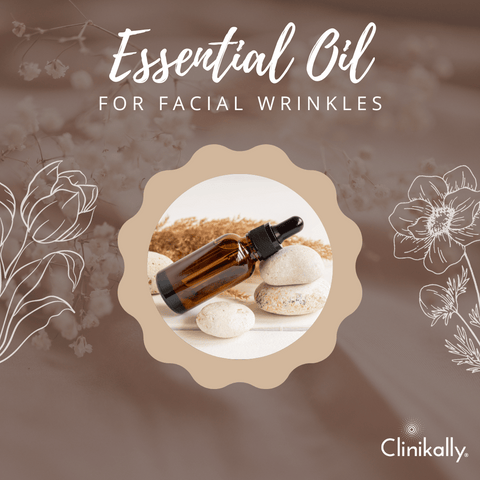
Essential oils have antioxidant, moisturising, and skin-nourishing qualities that make them a viable addition to skincare regimens aimed at minimising the appearance of facial wrinkles. Essential oils can be strong and irritate certain people, so it's important to properly dilute them and do a patch test before using them directly on your face. A few essential oils that are occasionally applied to wrinkles are as follows:
-
Rosehip Seed Oil: Rosehip seed oil, which is high in antioxidants and vitamins A and C, may help rejuvenate the skin, reduce fine lines, and improve skin texture.
-
Frankincense Oil: Known for its skin-toning and anti-aging properties, frankincense oil may aid in wrinkle reduction and smoother skin.
-
Lavender Oil: Lavender oil has soothing properties and may aid in skin regeneration, potentially reducing the appearance of fine lines.
-
Carrot Seed Oil: This oil is high in antioxidants and vitamins, which can help improve skin health and reduce the effects of ageing.
-
Geranium Oil: Geranium oil's astringent properties may help tighten skin and reduce the appearance of wrinkles and sagging.
-
Pomegranate Seed Oil: Pomegranate seed oil, which is high in antioxidants and omega fatty acids, is thought to promote collagen production and improve skin elasticity.
When applying essential oils to the skin for wrinkles, it is critical to dilute them properly with a carrier oil (such as jojoba oil, coconut oil, or sweet almond oil). A typical dilution ratio of essential oil in carrier oil is around 1-2%. To use these oils, first perform a patch test to rule out any allergic reactions. Apply a small amount of diluted oil to your inner forearm and wait 24-48 hours to see if there is any redness, irritation, or allergic reaction. Furthermore, essential oils should not be used in place of a well-rounded skincare routine that includes daily sunscreen application, moisturising, and a healthy lifestyle. If you have wrinkle concerns or are looking for a comprehensive anti-aging regimen, you should seek personalised advice and recommendations from a dermatologist or skincare professional.
Home remedies to reduce wrinkles on the neck
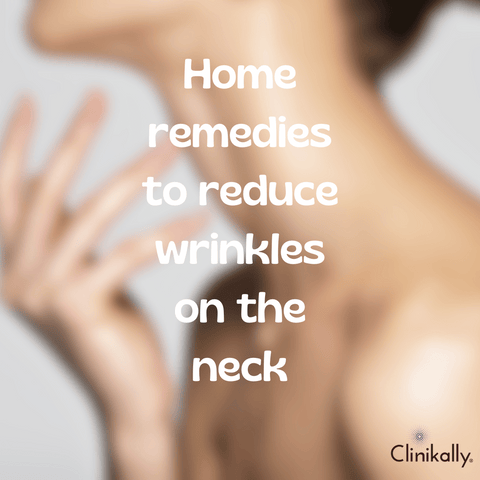
Natural home remedies that emphasise skin tightening, nourishing, and moisturising can be used to reduce neck wrinkles. The following natural methods could help reduce wrinkles around the neck:
-
Olive oil: Olive oil is rich in antioxidants and vitamin E that can help reduce the appearance of wrinkles on the neck. Massage a small amount of olive oil into your neck before bed and leave it on overnight.
-
Lemon juice: Lemon juice is a natural astringent that can help tighten the skin on your neck and reduce the appearance of wrinkles. Mix equal parts lemon juice and water and apply to your neck with a cotton ball. Leave on for 10 minutes before rinsing off.
-
Honey: Honey is a natural humectant that can help keep your skin hydrated and reduce wrinkles on the neck. Apply a thin layer of honey to your neck and leave on for 15-20 minutes before rinsing off.
When employing these DIY cures, consistency is essential. Although they might have certain advantages, every person's experience is different. Before attempting any new treatments, it's best to conduct a patch test or speak with a physician if you have any particular skin issues. In addition, leading a healthy lifestyle and shielding the neck from the sun's rays might help delay the emergence of wrinkles.
Natural neck firming techniques
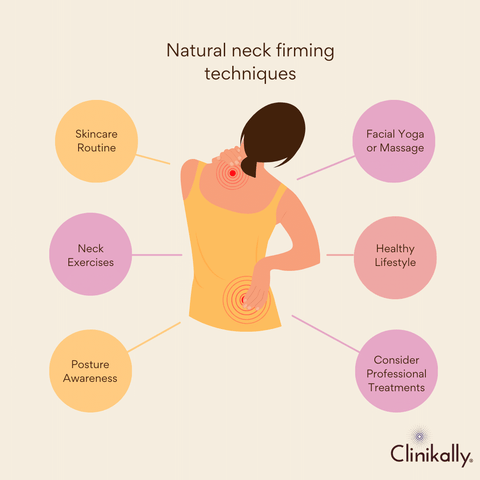
Various natural techniques that focus on skincare, exercises, and lifestyle changes can help to maintain a firm and youthful neck. Here are some natural methods for firming the neck:
-
Skincare Routine: Apply moisturisers or neck creams containing hydrating ingredients such as hyaluronic acid, glycerin, or peptides regularly to keep the skin hydrated and supple. Apply sunscreen with an SPF of at least 30 to the neck area to protect it from sun damage. Sun exposure can hasten skin ageing, causing sagging and wrinkles. Exfoliate the neck gently to remove dead skin cells and promote cell turnover. Use gentle exfoliants that are appropriate for your skin type.
-
Neck Exercises: Tilt your head back and look up at the ceiling to stretch your neck. For a few seconds, press your tongue against the roof of your mouth. Repeat several times to strengthen the muscles in your neck. Lift your chin towards the ceiling and pucker your lips as if kissing. To help tone the neck muscles, hold for a few seconds and repeat.
-
Facial Yoga or Massage: Engage in facial yoga exercises or gentle neck massages to help tighten and tone the muscles in the neck area. These exercises can improve blood circulation and help you look younger.
-
Healthy Lifestyle: Eat foods high in antioxidants, vitamins (particularly A, C, and E), and essential fatty acids. These nutrients are beneficial to skin health and collagen production. Drink plenty of water to keep your skin hydrated and elastic. Smoking and excessive alcohol consumption can hasten skin ageing and contribute to sagging skin. Avoiding these habits can help keep your skin firm.
-
Posture Awareness: To prevent neck muscle weakness brought on by improper alignment, maintain proper posture. Avoid slouching or hunching, which can cause neck sagging over time.
-
Consider Professional Treatments: Neck firming creams, neck masks, and professional treatments like radiofrequency therapy or laser treatments may help improve neck skin elasticity. For recommendations, consult a dermatologist or a skincare professional.
When practising these techniques, consistency is essential. Individual results may vary, and it may take some time to see visible improvements. Furthermore, it is critical to be patient and realistic about the results, because natural methods may not completely reverse the effects of ageing, but they can help to maintain skin health and firmness over time.
Hydration and nutrition for neck skin

Hydration and proper nutrition are critical for maintaining healthy skin, including neck skin. Here are some suggestions to keep your neck skin hydrated and nourished:
-
Stay Hydrated: Drink plenty of water throughout the day to keep your body and skin hydrated. Hydration is essential for keeping skin elasticity and supple, including the skin on the neck.
-
Moisturisers: Use moisturisers or neck creams regularly to keep the skin on your neck hydrated. To lock in moisture and prevent dryness, look for products that contain ingredients such as hyaluronic acid, glycerin, ceramides, or natural oils.
-
Balanced Diet: Eat a well-balanced diet rich in nutrients that promote skin health: Include foods high in vitamins A, C, E, and K. These vitamins help with skin repair, collagen production, and environmental protection. Lean proteins can help support skin structure and repair. Some examples of these include fish, poultry, tofu, and legumes. Eat foods high in omega-3 fatty acids, which are good for skin health, such as avocados, nuts, seeds, and fatty fish like salmon. To fight free radicals that can harm skin cells, eat a range of vibrant fruits and vegetables that are high in antioxidants.
-
Collagen-Boosting Foods: These include foods that help the body produce collagen, like collagen peptides, and bone broth, and foods high in vitamin C, like bell peppers, strawberries, and citrus fruits.
-
Foods that Hydrate: To help you stay hydrated overall, eat foods high in water content, such as celery, tomatoes, cucumbers, and watermelon.
-
Avoid Dehydrating Factors: Drinking too much alcohol or caffeine can dehydrate people and alter their skin's moisture content. Limit your intake of these types of beverages.
Remember that maintaining skin health necessitates a multifaceted approach that includes both internal and external care. While a healthy diet and adequate hydration support skin health from within, applying moisturisers or neck creams can help retain moisture and promote skin hydration on the outside. Furthermore, regularly protecting the neck area from sun damage with sunscreen is critical for maintaining its health and youthful appearance.
Home remedies to reduce wrinkles around the eyes
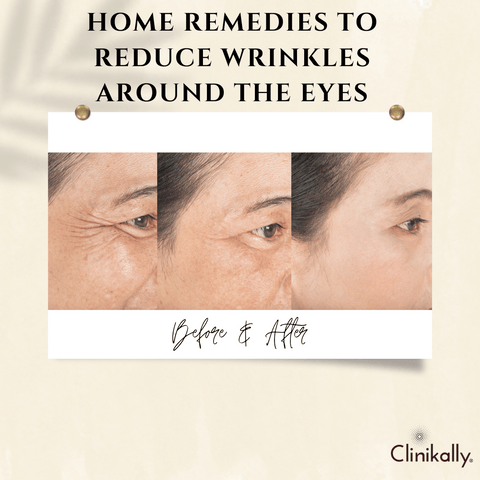
Reducing wrinkles around the eyes can involve gentle home remedies that aim to hydrate, nourish, and tighten the delicate skin in that area. Here are some effective home remedies you can try:
-
Cucumber: Cucumber is a natural anti-inflammatory that can help reduce the appearance of wrinkles around the eyes. Cut a cucumber into slices and place them over your closed eyes for 15-20 minutes.
-
Green tea bags: Green tea is rich in antioxidants that can help reduce wrinkles around the eyes. Simply steep a couple of green tea bags in hot water, let them cool, and then place them over your closed eyes for 15-20 minutes.
-
Almond oil: Almond oil is rich in vitamins A and E that can help reduce wrinkles around the eyes. Simply apply a small amount of almond oil to the skin around your eyes before bed and leave it on overnight.
While utilising these natural therapies, consistency is key, individual outcomes may differ. Before attempting new treatments, get advice from a dermatologist or conduct a patch test if you have certain skin issues or sensitivities. Furthermore, applying sunscreen and shielding the sensitive skin around the eyes from the sun can help stop additional wrinkling and damage.
Gentle remedies for delicate under-eye skin

The skin around the eyes is delicate and sensitive, necessitating gentle treatment to address issues such as puffiness, dark circles, and fine lines. Here are some gentle remedies and practises designed specifically for the sensitive under-eye area:
-
Cucumber Slices or Tea Bags: For about 10-15 minutes, place chilled cucumber slices or steeped and cooled tea bags (green tea or chamomile) over closed eyelids. Their anti-inflammatory qualities can help minimise puffiness and soothe the area under the eyes.
-
Cold compress or chilled spoon: To help constrict blood vessels, reduce puffiness, and refresh the delicate skin around the eyes, apply a cold compress or a chilled spoon (kept in the refrigerator) for a few minutes.
-
Gentle Eye Massage: Using your ring finger, lightly tap or move in a circular motion to massage the area beneath your eyes. To reduce pulling or tugging, use a tiny amount of eye cream or a mild moisturiser designed specifically for the eye area.
-
Hydration: Stay hydrated by drinking plenty of water throughout the day to keep your skin moisturised. Proper hydration keeps the skin around the eyes plump and supple.
-
Use Gentle Eye Products: Select eye creams or serums designed specifically for the delicate eye area. Look for products that contain hydrating and nourishing ingredients such as hyaluronic acid, ceramides, antioxidants (such as vitamin C or E), or peptides.
-
Sun Protection: Wear sunglasses and apply sunscreen to the under-eye area daily to protect the skin from harmful UV rays, which can contribute to premature ageing and dark circles.
-
Aloe Vera Gel: To soothe and hydrate the skin, apply a small amount of pure aloe vera gel to the under-eye area. Make sure it is pure and free of added fragrances or alcohol, which could irritate sensitive skin.
-
Gentle Makeup Removal: When removing makeup, use a gentle makeup remover designed specifically for the eyes to avoid rubbing or tugging on the delicate skin.
-
Adequate Sleep: Get enough quality sleep because sleep deprivation can contribute to under-eye puffiness and dark circles.
-
Avoid Rubbing or Pulling: To avoid unnecessary pulling or stretching of the delicate skin around the eyes, be gentle when applying skincare products or touching the skin around the eyes.
Always conduct a patch test to check for any negative reactions on the delicate skin surrounding the eyes before using new products or therapies there. For individualised guidance and appropriate treatment choices, think about seeing a dermatologist or skincare specialist if you have particular concerns about the under-eye area.
Preventing crow's feet naturally
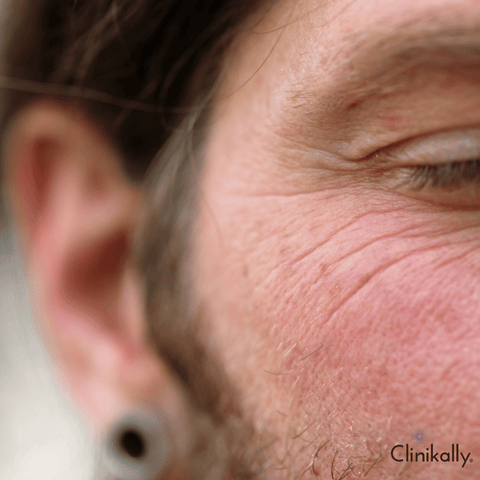
Preventing crow's feet, or fine lines and wrinkles around the eyes, requires a combination of natural practises, healthy habits, and skincare routines. Here are some natural ways to prevent or reduce the appearance of crow's feet:
-
Sun Protection: Wear sunglasses and apply sunscreen with an SPF of at least 30 every day to protect the delicate skin around your eyes. Sun exposure can hasten skin ageing and contribute to the formation of crow's feet.
-
Hydration: Drink plenty of water to keep your skin hydrated. Proper hydration keeps the skin plump and reduces the appearance of fine lines.
-
Eye Exercises: Do eye exercises that involve gently massaging or stretching the muscles around the eyes. Close your eyes and roll them clockwise and anticlockwise to stimulate blood circulation and relax the eye muscles, for example.
-
Healthy Diet: To support skin health, eat a diet high in antioxidants, vitamins, and essential fatty acids. Consume fruits and vegetables, nuts and seeds, and omega-3 fatty acids (found in fish).
-
Facial Yoga: Use facial yoga exercises to tone and strengthen the muscles around your eyes. These exercises may help reduce the appearance of crow's feet.
-
Adequate Sleep: Allow your skin to rejuvenate and repair itself by getting enough quality sleep. Sleep deprivation can contribute to premature ageing and the formation of fine lines.
-
Gentle Skincare: Use gentle skincare products designed specifically for the eye area. Look for eye creams or serums that contain retinoids, hyaluronic acid, peptides, or antioxidants, as these ingredients can help improve skin texture and reduce the appearance of fine lines.
-
Avoid Rubbing Your Eyes: Avoid rubbing or pulling on the skin around your eyes, as this can contribute to the breakdown of collagen and elastin, resulting in wrinkle formation.
-
Reduce Squinting: Protect your eyes from bright lights and, if necessary, use prescription glasses or sunglasses to reduce squinting, which can contribute to the development of crow's feet.
-
Facial Massage: Use a light touch to massage your face, including the area around your eyes, to improve blood circulation and relax the muscles.
To avoid and minimise the appearance of crow's feet, consistency in these techniques is essential. Although using these natural techniques might help achieve healthier-looking skin, individual outcomes may differ. For advice catered to your skin type and requirements, see a dermatologist or skincare specialist if you have specific concerns or would like customised recommendations.
Home remedies to reduce wrinkles on the hands
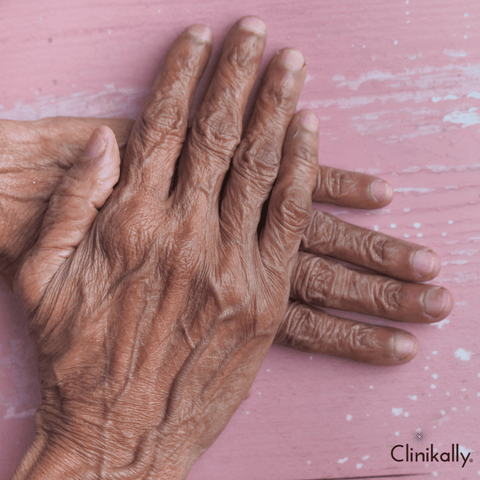
Many natural treatments for hydrating, nourishing, and revitalising the skin can help reduce wrinkles on the hands. Try these potent natural cures at home:
-
Sugar: Sugar is a natural exfoliant that can help reduce wrinkles on the hands. Mix equal parts sugar and olive oil and massage into your hands for 2-3 minutes. Rinse off with warm water.
-
Milk: Milk is a natural moisturiser that can help reduce wrinkles on the hands. Soak your hands in a bowl of warm milk for 10-15 minutes.
-
Banana: Banana is rich in potassium, vitamins A and E that can help reduce wrinkles on the hands. Mash up a banana and apply it to your hands, leave it on for 15-20 minutes before rinsing off.
It's important to use these home remedies consistently. Although there might be some advantages, each person's experience may differ. Further wrinkles and damage can be avoided by using sunscreen, using gloves when performing domestic duties, and shielding your hands from harmful chemicals.
Restorative treatments for hand skin

There are several restorative treatments and practises you can try to restore and rejuvenate the skin on your hands:
-
Moisturise regularly: After washing your hands, apply a moisturising hand cream or lotion. To hydrate and nourish the skin, look for products that contain shea butter, glycerin, hyaluronic acid, or ceramides.
-
Exfoliation: Once or twice a week, use a gentle hand scrub or exfoliating treatment to remove dead skin cells and improve skin texture. Exfoliation aids in the rejuvenation of the skin on your hands.
-
Sunscreen: Apply sunscreen to your hands every day, especially when they are exposed to sunlight. Sun protection for your hands helps prevent sun damage, age spots, and premature skin ageing.
-
Hand Masks or Overnight Treatments: Apply a thick layer of moisturiser before bedtime and wear cotton gloves overnight to allow deep hydration and skin repair.
-
Retinol or Retinoid Creams: To stimulate collagen production and improve skin texture, use creams or serums containing retinol or retinoids. However, use caution when using these products on your hands because they can cause sensitivity.
-
Vitamin C Serums: Using your hands, apply vitamin C serums or creams. Vitamin C helps brighten the skin, fade dark spots, and promote collagen synthesis, aiding in skin rejuvenation.
-
Paraffin Wax Treatment: Paraffin wax treatments can deeply moisturise and soften the skin on your hands. It entails several dips of your hands in warm paraffin wax, followed by wrapping your hands and allowing the wax to penetrate the skin.
-
Hydrating Gloves: Use hydrating gloves to lock in moisture and aid in the absorption of hand creams or lotions. These gloves can be worn for an extended period, allowing for intense hydration.
-
Professional Treatments: To address sun damage, age spots, or skin texture concerns on the hands, consider professional treatments such as chemical peels, laser treatments, or intense pulsed light (IPL) therapy provided by dermatologists or skincare professionals.
-
Healthy Lifestyle Habits: Stay hydrated, eat a nutritious diet, and avoid excessive exposure to harsh chemicals or hot water, which can contribute to dryness and skin damage on your hands.
Consistency and a combination of these treatments and practises can aid in the restoration and maintenance of the health and appearance of your hands. If you have specific concerns or skin conditions, it is best to consult a dermatologist or skincare professional for customised recommendations and treatments.
Protecting hand skin from ageing

Preventing premature ageing of your hands entails taking preventive measures and incorporating good skincare habits to keep their healthy and youthfulness. Here are some ways to keep your hand skin looking young:
-
Sun protection: Apply sunscreen to your hands regularly, especially when they are exposed to sunlight. Sunspots, wrinkles, and skin ageing can all be caused by UV rays. Apply a broad-spectrum sunscreen with at least SPF 30 every two hours, or more frequently if hands are washed or exposed to water.
-
Moisturise frequently: Keep your hands hydrated throughout the day by applying a moisturising hand cream or lotion, especially after washing your hands. To prevent dryness, look for products that contain ingredients like hyaluronic acid, glycerin, or shea butter.
-
Wear Gloves: Wear gloves to protect your hands while performing household chores, gardening, or using cleaning products. This reduces skin irritation caused by harsh chemicals and hot water.
-
Use Gentle Soaps: Select mild, moisturising hand soaps or skin-friendly cleansers. Avoid using harsh soaps or hand sanitizers, which can strip natural oils and cause dryness.
-
Regular Exfoliation: Exfoliate your hands once or twice a week to remove dead skin cells and promote skin cell turnover. Use a gentle scrub or exfoliating treatment designed specifically for the hands.
-
Healthy Lifestyle: To promote general skin health, eat a balanced diet high in vitamins, antioxidants, and essential fatty acids. Foods high in vitamins A, C, E, and omega-3 fatty acids promote skin health.
-
Hydrating Treatments: To deeply moisturise and rejuvenate the skin on your hands, consider using overnight hydrating treatments, hand masks, or paraffin wax treatments.
-
Avoid Smoking and Excessive Alcohol Consumption: Both smoking and excessive alcohol consumption can hasten skin ageing. Avoiding these habits can help you keep your skin looking young.
-
Hand Massage regularly: Massage your hands with a nourishing hand cream or oil to improve blood circulation and skin elasticity.
-
Professional Treatments: If you have severe sun damage, age spots, or significant signs of ageing on your hands, consider professional treatments offered by dermatologists or skincare professionals such as chemical peels, laser therapy, or microdermabrasion.
By incorporating these protective measures into your daily routine, you can help protect your hands from premature aging and maintain their youthful appearance and health. Consistency in skincare practices and protective habits is crucial for long-term hand health.
Indian home remedies for ageing
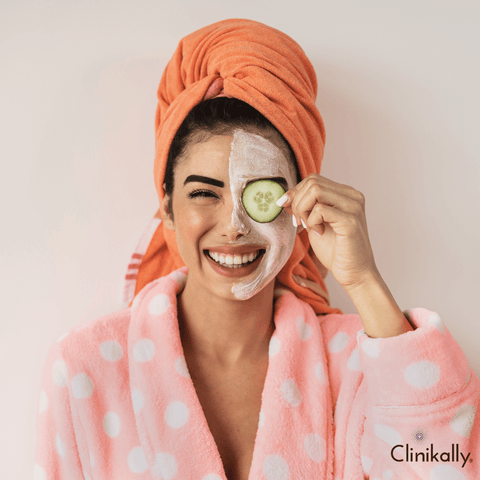
Many natural home remedies have long been utilised in India to treat ageing indications and encourage youthful skin. The following well-liked Indian home cures are thought to aid in preventing ageing signs:
-
Turmeric: Turmeric is a natural anti-inflammatory that can help reduce the appearance of wrinkles. Mix a pinch of turmeric with a tablespoon of honey and apply the mixture to your face and leave it on for 15-20 minutes before rinsing off.
-
Sandalwood: Sandalwood is a natural astringent that can help tighten the skin and reduce the appearance of wrinkles. Mix a pinch of sandalwood powder with a tablespoon of rose water and apply the mixture to your face. Leave it on for 15-20 minutes before rinsing off.
-
Curd: Curd is rich in lactic acid that can help exfoliate the skin and reduce the appearance of wrinkles. Apply a thin layer of curd to your face and leave it on for 15-20 minutes before rinsing off.
Keep in mind that every person has a different type of skin, so it's important to do a patch test before using any new ingredients—especially if you have allergies or sensitive skin. When employing these natural therapies, it's important to be patient and consistent. See a dermatologist or other skincare specialist for specific guidance or if you have serious skin concerns.
Traditional Ayurvedic practices for skin health

Ayurveda, an Indian traditional system of medicine, emphasises a holistic approach to health, including skincare. Here are some traditional Ayurvedic practises that can help you keep your skin healthy:
-
Identifying Doshas: According to Ayurveda, everyone has a different constitution or dosha—Vata, Pitta, and Kapha. Understanding your dominant dosha can help you make better skincare and dietary choices.
-
Balanced Diet: Ayurveda emphasises a balanced diet that is tailored to your dosha. Consume a variety of fresh, whole foods such as fruits, vegetables, grains, nuts, seeds, and lean proteins to support overall health, including skin health.
-
Internal Cleansing: Panchakarma detoxification practises involve therapies to eliminate toxins from the body. This can help to maintain healthy skin by encouraging internal cleansing and balance.
-
Herbal Remedies: Ayurveda uses a variety of herbs and botanicals for skincare. Herbs with antibacterial, anti-inflammatory, and skin-nourishing properties, such as turmeric, neem, aloe vera, sandalwood, and holy basil, are commonly used.
-
Abhyanga (Oil Massage): Abhyanga, or regular self-massage with herbal oils, can promote circulation, relax the body, and nourish the skin. This practise aids in the preservation of skin hydration and suppleness.
-
Facial Cleansing: A traditional Ayurvedic approach to skin health is to cleanse the face with natural ingredients such as chickpea flour (besan), turmeric, rose water, or honey.
-
Adapting to Seasons: According to Ayurveda, skincare routines should be adjusted according to the seasons and environmental changes. This includes using skincare products and practises appropriate for each season.
-
Stress Management: According to Ayurveda, stress has an impact on skin health. Meditation, yoga, and deep breathing techniques can all help manage stress, which benefits overall health, including the skin.
-
Ayurvedic Face Masks: Using natural face masks made from ingredients such as turmeric, sandalwood, honey, or yoghurt to address various skin concerns and maintain skin radiance is a common Ayurvedic practise.
-
Ayurvedic Consultation: Consult with an Ayurvedic practitioner or skincare expert for personalised skincare advice based on your dosha and individual constitution. They can suggest specific treatments and practises based on your skin type and concerns.
As with any holistic approach, consistency and individualised care are essential in Ayurvedic practises for skin health. Before incorporating new practises, seek advice from qualified practitioners, especially if you have specific skin conditions or concerns.
Herbal ingredients in Indian skincare
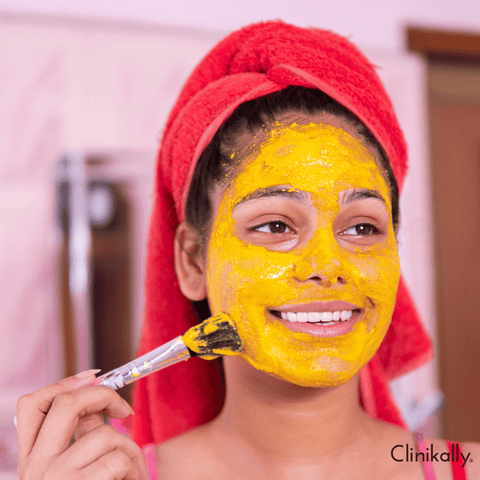
Indian skincare frequently includes a wide variety of herbal ingredients that are deeply rooted in Ayurveda and traditional practises. These herbal ingredients are well-known for their skin-health benefits. Here are some herbal ingredients that are commonly used in Indian skincare:
-
Turmeric (Haldi): Turmeric is used in skincare to brighten the complexion, reduce inflammation, and treat acne due to its anti-inflammatory and antioxidant properties.
-
Neem: Known for its antibacterial and antifungal properties, neem is used to treat skin conditions such as acne, eczema, and inflammation. It's also valued for its cleansing and purifying properties.
-
Sandalwood (Chandan): Sandalwood has antimicrobial properties and is used to soothe and cool the skin. It is frequently used to treat acne, reduce blemishes, and give skin a healthy glow.
-
Aloe Vera: Aloe vera has moisturising, healing, and soothing properties. It soothes irritated skin, hydrates it, and can help treat sunburns and other skin irritations.
-
Tulsi (Holy Basil): Tulsi's antibacterial and antioxidant properties aid in detoxification, acne treatment, and skin rejuvenation.
-
Rose Water: Rose water has skin-cooling and hydrating properties. It is used as a toner to balance the pH of the skin, reduce redness, and refresh it.
-
Amla (Indian Gooseberry): Amla, which is high in Vitamin C and antioxidants, brightens the skin, tightens pores, and promotes collagen production, resulting in younger-looking skin.
-
Saffron (Kesar): Saffron has skin-brightening properties. It is used to smooth skin, lighten pigmentation, and add a natural glow.
-
Honey: Honey is valued for its antibacterial and moisturising properties. It soothes and nourishes the skin while also providing hydration.
-
Mulethi (licorice): Mulethi is used for its skin-lightening properties. It aids in the reduction of hyperpigmentation and the treatment of uneven skin tone.
Various formulations, face masks, serums, oils, and skincare products frequently incorporate these herbal constituents to target certain skin issues and enhance general skin health. They have been utilised for millennia in Indian skincare practices and are said to be helpful because of their natural characteristics. Before adding new herbal elements to your routine, always conduct a patch test and take into account your skin type. This goes double for any skincare regimen. For individualised guidance, it is advised to speak with a dermatologist or skincare specialist, particularly if you have certain skin disorders or concerns.
How to get rid of wrinkles permanently at home

It is important to note that there is no one definitive solution for getting rid of wrinkles permanently. Wrinkles are a natural part of the ageing process, and while home remedies can help reduce their appearance, they cannot completely eliminate them. However, these remedies can help slow down the ageing process and make your skin look and feel youthful.
In conclusion, there are many natural home remedies that can help reduce the appearance of wrinkles. Whether you're looking to reduce wrinkles on your face, neck, hands or around your eyes, there's a remedy for you. Try incorporating these remedies into your daily skincare routine and see the difference for yourself. Remember that a healthy lifestyle, adequate sleep, hydration, and sun protection are also important to keep wrinkles at bay.
Long-term lifestyle changes for wrinkle prevention
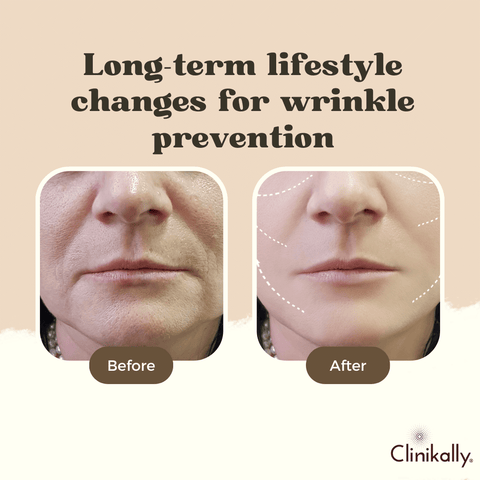
Long-term wrinkle prevention entails adopting healthy lifestyle habits that promote overall skin health and reduce wrinkle development. Here are a few lifestyle changes that can help prevent wrinkles in the long run:
-
Using sunscreen with a minimum SPF of 30 every day, even on overcast days, will help shield your skin from damaging UV radiation. Limit your time in the sun, especially during the hottest parts of the day. When you are outside, cover up with hats, sunglasses, and protective clothes.
-
A balanced diet high in vitamins, minerals, and antioxidants is the foundation of a healthy diet. Incorporate foods rich in omega-3 fatty acids, whole grains, lean meats, fruits, and vegetables to promote healthy skin.
-
Water is essential for maintaining skin hydration, so drink lots of it. Maintaining skin suppleness and elasticity through proper hydration helps minimise wrinkles and fine lines.
-
Smoking causes wrinkles and hastens the ageing of the skin. Giving up smoking can greatly enhance skin health and lower the chance of premature ageing.
-
Drinking too much alcohol can cause the skin to become dry and may even exacerbate the appearance of wrinkles. Moderate alcohol consumption can help maintain healthy skin.
-
Get enough sleep every night to let your skin regenerate and repair itself. Sleep deprivation can make skin appear lifeless and exhausted, which may accentuate wrinkles.
-
Prolonged stress can harm your skin's quality and hasten the ageing process. Reduce your stress by engaging in deep breathing exercises, yoga, meditation, or other stress-reduction strategies.
-
Exercise regularly to support skin cell oxygenation, enhance blood circulation, and preserve general skin health. Exercise can maintain healthy, glowing skin.
-
Make certain that your skincare routine is appropriate for your skin type. To keep your skin healthy and hydrated, use gentle cleansers, moisturisers, and skincare products.
-
Repetitive facial movements, such as squinting or frowning, can cause fine lines and wrinkles to form over time. Pay attention to your facial expressions and consider wearing sunglasses to avoid squinting in bright light.
In the long run, consistency in implementing these lifestyle changes can help to prevent wrinkles and promote healthier, more youthful-looking skin. While these habits can help prevent wrinkles, other factors such as genetics and natural ageing can still influence wrinkle development. A dermatologist or skincare professional can provide tailored recommendations for effective wrinkle prevention based on your skin type and concerns.
Home-made serums and creams for lasting results

Making your serums and creams is a natural and inexpensive way to nourish and care for your skin. Here are a few homemade serum and cream recipes for you to try:
-
Ingredients: 1 tablespoon rose water, 1 tablespoon aloe vera gel, 1 teaspoon vegetable glycerin, and 3–4 drops essential oil of your choice (rosehip or lavender, for example).
-
Instructions: In a small bowl, combine the vegetable glycerin, rose water, and aloe vera gel. Mix well after adding a few drops of your preferred essential oil. To make application easier, transfer the mixture to a sanitised dropper bottle. After washing your face and neck, apply a few drops of this serum and then moisturise.
-
Ingredients: 1 tablespoon jojoba oil, 1 teaspoon rosehip oil, 2 tablespoons shea butter, 5–6 drops essential oils of frankincense and lavender.
-
Instructions: Use a double boiler or the microwave to melt the shea butter until it turns liquid. Mix thoroughly after adding the jojoba and rosehip oils to the melted shea butter. Allow the mixture to cool slightly and add the frankincense and lavender essential oils. Stir thoroughly and transfer the cream to a clean jar or container. Apply a small amount of this cream to your face and neck after cleansing and toning, preferably in the evening.
-
Ingredients: 1 teaspoon of powdered vitamin C, 1 tablespoon of rose or distilled water, and 1 teaspoon of vegetable glycerin.
-
Directions: Mix the powdered vitamin C with water until it dissolves completely. Incorporate the plant-based glycerin thoroughly. Transfer the serum to a dark-colored dropper bottle to protect it from light. Apply a few drops of this serum to clean skin before moisturizing, preferably in the morning.
Natural components used in these diy serums and creams are well-known for their ability to nurture skin. But since every person's skin reacts differently, it's important to keep an eye on how your skin is responding and stop using the product if irritation starts to appear. For individualised guidance and appropriate skincare products, it's best to visit a dermatologist or skincare professional if you have specific skin disorders or concerns.

































3 comments
Ednah
Great advice dia ones
Great advice dia ones
Mailyn
Hi! Thank you for these, will try someof these.
Hi! Thank you for these, will try someof these.
Yusuf abubakar isa
Neck wrinkle home remedy
Neck wrinkle home remedy